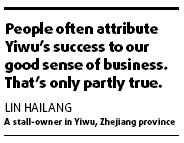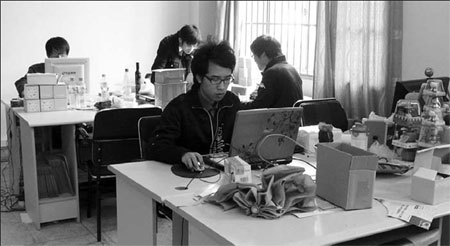Success is child's play
|
Students of the Yiwu Industrial and Commercial College sell products, such as toys. |
|
Online through their personal virtual shops at Taobao.com. Zhang Zhiping and Lin Shujuan |
Traditionally, students in China have been expected to focus only on their studies and turn a deaf ear to things outside the window (Liang er bu wen chuang wai shi). But students in a little known vocational college in East China's Zhejiang province are being encouraged by their teachers to start small businesses online.
The student entrepreneurs are not only making good money but have acquired something even more valuable - self-respect and a broader horizon.
A stroll through the Yiwu Industrial and Commercial College, a county-level vocational college in Yiwu, Zhejiang, gives visitors the feeling that they are touring a vast e-commerce company with about 1,200 "employees".
Glued to their desktops or laptops, the students are busy bargaining with customers online in dormitories, dining rooms or the "Starting Business Center" - a 5-story building for students.
The students have proven themselves quick learners in the real biz world: School authorities estimate that they have generated more than 25 million yuan ($3.7 million) per year from their online business.
Yang Fugang is one of the best players. Just 25, he is already a campus hero. He got started one-and-a-half years ago, with 1,000 yuan borrowed from his parents and a laptop that he had initially planned to use for online games.

The only son of a poor farmer family in Zhejiang now has a monthly gross turnover of more than 350,000 yuan, with an average of 100 transactions every day and seven people to help him.
Yang says he would have never dreamt of running an online business if he had not arrived in Yiwu, known throughout China as the "capital of small commodities".
"Everyone becomes a merchant after staying in Yiwu for two days," says Yang with a broad smile.
The first night he arrived at the college, some senior students dropped by his dorm, selling locks. Yang was struck by their sharp business acumen and their natural way of doing business.
Yiwu people have long been known as born traders even before China made a shift toward a market economy. Local farmers exchanged homemade candies for chicken feathers, which they made into dusters to earn cash.
Not far from the college is the world-famous Yiwu Futian International Market. The 40,000 stalls selling 200,000 varieties of daily goods, such as socks, small ornaments and toys, attract buyers from all over the world.
Another factor in the students' business success is that most of them manage their virtual shops at Taobao.com, one of the most profitable e-commerce companies under Alibaba, the country's biggest Nasdaq-listed e-company.
Taobao, which started operations in 2003, recorded a total consumer-to-consumer (C2C) transaction volume of 98 billion yuan last year, accounting for more than 80 percent of the country's total C2C transaction volume, according to a report by Shanghai-based iResearch Consulting Group.
The group's Zhang Yanping says the advantages of online shopping, such as lower product prices and convenience, have become even more important in the ongoing global financial crisis.
"During hard times, people come under more professional and personal pressure, and tend to consume less. Internet shopping helps them cut expenditures," she says.
Yang and his schoolmates were among the first in the country to test the waters of C2C business before the rest awoke to the huge potential of the emerging market.
By the time the full impact of the financial crisis was felt, Yang had already acquired high online ratings and this helped draw in more online shoppers.
Online buyers tend to gravitate toward e-shops with high ratings. Taobao's ratings are divided into three categories - red heart, diamond and crown based on sales volume and customer feedback. A crown rating can be earned only if the shop can show the completion of 10,000 transactions. Yang's shop has earned three crowns.
There is a consensus on campus that their business success owes much to the support of local merchants from the market. Zhou Zhenhui, a sophomore who has become his classmates' upstream supplier, says he spends half the day scouting for innovative goods in the market which is now almost like his second home.
Most stalls give him and other students the lowest prices, and even take orders without any down payment, Zhou says.
Yang's recounting of his first online transaction shows just how difficult it is for the students in the beginning. For a mere 0.5-yuan profit on a toy, Yang had to get to the market located about 3 km away.
It was a sizzling summer. If Yang took a bus, he would lose 1.5 yuan from the deal. In the end, he cycled all the way and recalls how he was soaked in sweat by the time he concluded the deal.
"These students are really hardworking," says stall-owner Lin Hailang, who is about Zhou's age. He has been in the business with his parents from a young age.
"People often attribute Yiwu's success to our good sense of business. That's only partly true," Lin says.
The market for small commodities faces stiff competition because of its easy market entry. Lin says his parents didn't have much of a competitive edge when they started out.
"Without hard work, perseverance and determination, we won't be here today," Lin says. "These students remind me of my parents."
(China Daily 04/20/2009 page8)
















